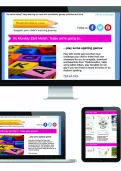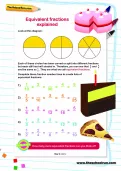Important update from TheSchoolRun
For the past 13 years, TheSchoolRun has been run by a small team of mums working from home, dedicated to providing quality educational resources to primary school parents. Unfortunately, rising supplier costs and falling revenue have made it impossible for us to continue operating, and we’ve had to make the difficult decision to close. The good news: We’ve arranged for another educational provider to take over many of our resources. These will be hosted on a new portal, where the content will be updated and expanded to support your child’s learning.
What this means for subscribers:
- Your subscription is still active, and for now, you can keep using the website as normal — just log in with your usual details to access all our articles and resources*.
- In a few months, all resources will move to the new portal. You’ll continue to have access there until your subscription ends. We’ll send you full details nearer the time.
- As a thank you for your support, we’ll also be sending you 16 primary school eBooks (worth £108.84) to download and keep.
A few changes to be aware of:
- The Learning Journey weekly email has ended, but your child’s plan will still be updated on your dashboard each Monday. Just log in to see the recommended worksheets.
- The 11+ weekly emails have now ended. We sent you all the remaining emails in the series at the end of March — please check your inbox (and spam folder) if you haven’t seen them. You can also follow the full programme here: 11+ Learning Journey.
If you have any questions, please contact us at [email protected]. Thank you for being part of our journey it’s been a privilege to support your family’s learning.
*If you need to reset your password, it will still work as usual. Please check your spam folder if the reset email doesn’t appear in your inbox.
How to help your child develop study skills

Towards the end of primary school, you’ll probably notice a shift away from task-based homework towards independent studying, such as researching a topic or revising for tests. And with SATs and secondary school approaching, learning good study habits is essential.
‘In the latter stages of primary school, students are encouraged to take more responsibility for their learning,’ says James Righetti, UK managing director of Elevate Education. ‘Children with good working habits are more resilient at secondary school, when the workload increases.’


Boost Your Child's English & Maths!
- Weekly programme for each school year
- Worksheets sent direct to your inbox
- Keeps your child's learning on track
Being an independent learner also fosters greater success and enjoyment: ‘When children explore a subject for themselves, they become engaged with it and develop a better understanding,’ adds Juliette Collier, deputy chief executive of the Campaign for Learning.
So how can you help your child develop the study skills that will help them now and in the future?
Study skill 1: organising the workload
Practise without pressure
Get your child used to taking responsibility for their workload before he’s in a crunch situation. ‘One good way is to get them involved in a project that taps into their interests, whether that’s football or Pokemon,’ suggests Juliette. ‘This gives them a chance to practise the organisational process and become more effective.’
Break it down
Show your child how to break a task down into manageable sections. ‘Rather than looking at the essay as a whole, separate it out into planning, researching, and then writing the introduction, middle and end, so it feels more manageable,’ James advises.
Be goal-focused
Encourage your child to plan and set goals before beginning a project, and to evaluate those goals afterwards: have they achieved them, or do they need more work? What could they do differently next time to make things easier?
Study skill 2: taking notes
Practise with something familiar
One way to help your child understand the basics of note-taking is to practise with a familiar story or another piece of writing that they've enjoyed. ‘Ask them questions about it: “What are the most important things in this book? What do you remember best about it?”’ Juliette advises. ‘This helps your child distinguish between the core messages and the peripheral information, which is important when it comes to taking notes.’
Don’t write too much
Trying to write down every word the teacher says not only makes it hard to keep up, but also leaves your child with too much information to retain. ‘Encourage your child to note just the trigger words; it’s like writing a reminder on the back of your hand,’ says James.
Read it back
‘So that your child doesn’t forget what was said, the key is to review what they've written afterwards, and keep reviewing it regularly,’ says James. Your child can also add any extra details that pop back into their mind.
Study skill 3: revising and preparing for exams
Make it manageable
‘Help your child get used to chunking: breaking revision tasks down into small, manageable parts that he can focus on one at a time,’ says Juliette.
Look at past papers
Doing practice papers is the best form of exam prep. ‘As well as familiarising your child with the format, it helps them to memorise the information through repeated practice,’ says James. ‘Don’t worry about doing them under exam conditions, especially at first: do them open book, with no time limit, and ask people for help if you need it: this helps build confidence.’
Use visual aids
Filing cards, highlighters, mind-mapping, sticky notes around the house... Encourage your child to use visual aids to help the information stick in their mind.
Soothe stress
‘Anxiety is one of the biggest barriers to performing well in tests, so help your child by talking about how they are feeling,’ says Juliette.
Study skill 4: research skills
Don’t just go online
The internet is a great information source, but encourage your child to be resourceful by also using books (at home and in the library), encyclopaedias, surveys and interviews of friends and family members and visits to museums and other relevant places in their research. (Look through our list of best reference books for children if your'd like to invest in some tools for use at home.)
Look for multiple sources
‘Help your child evaluate information to check if it’s accurate, for example by looking at multiple sources to see if they’re consistent,’ says Juliette.
Find the counterargument
‘A vastly underestimated research skill is to find your information, and then look for sources that offer the counterargument; this helps your child to present balanced, in-depth information,’ says James.
Study skill 5: time management
Think task, not time
‘It’s easy for children to spend a long time appearing to work but actually doing very little,’ James explains. ‘Encourage your child to set himself a task and finish it, rather than measuring success by how long they're at their desk.’
Draw up a timetable
‘Get your child to timetable not just homework time, but also clubs and activities, mealtimes, and time to watch TV, play on the computer or read,’ James suggests. ‘This helps ensure they make time for everything they need to do.’
Don’t put it off
Encourage your child to do their homework as soon as they get home. ‘This incentivises them to be productive, because once it’s finished they can relax,’ James explains.
Make learning part of life ‘As well as setting aside times for work, try to embed learning into everyday life,’ suggests Juliette. ‘Talking about a project and asking questions in the car or over dinner could be the best learning experience of the day.’
Advice about studying in KS3 and KS4
Find more information about essay writing, exam revision, studying for A-Levels, choosing a university, writing a personal statement, completing a UCAS form and exploring alternative routes into higher education such as apprenticeships on the Mark Your Mark website from Middlesex University.
The most effective studying and revision strategies are also highlighted in this video for older learners:











